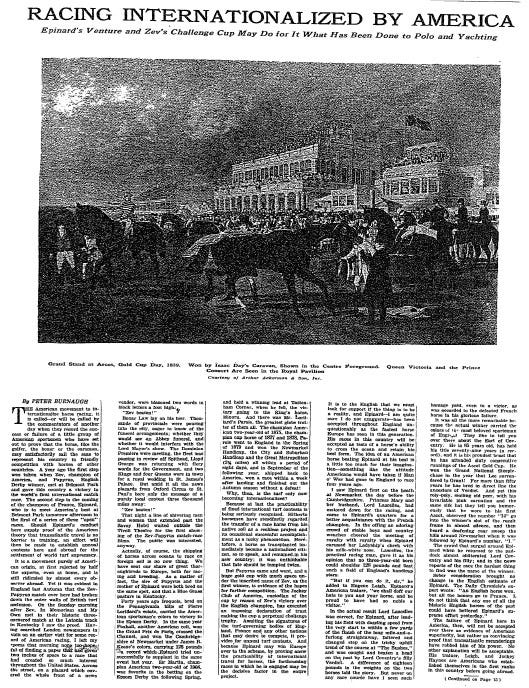Racing Internationalized by America
In an August 1924 New York Times Magazine article, Peter Burnaugh — one of the most famous journalists covering horse racing — asked whether the sport would soon establish regular international competitions. It was not to be.
Around this period, major international competitions began emerging in other sports. Golf's Ryder Cup began three years later in 1927, while soccer's World Cup began six years later in 1930 — both of which still occur to this day.
In 1923, the year prior to the article's publication, the reigning Kentucky Derby and Belmont Stakes winning horse (Zev) raced against England's reigning Epsom Derby champion (Papyrus). The event attracted 70,000+ spectators and a nationwide radio audience.
So in September and October 1924, three follow-up "International Specials" were held between top American and top European horses, including French champion Epinard. Epinard would go on to finish second place in all three races, a result Burnaugh predicted as a potential outcome:
The failure of Epinard here in America, then, will not be accepted over there as evidence of American superiority, but rather as convincing proof that transatlantic meanderings have robbed him of his power. No other explanation will be acceptable.
Why didn't such international horse races really last in American culture?
Part of it might be the decline of horse racing's popularity over the past century just in general. Certainly the culture hasn't produced any horses nearly as famous and omnipresent in the media as Seabiscuit in the 1930s or Secretariat in the 1970s. It's hard to imagine "everyone" watching a horse race on television now, the way everyone listened on the radio back in the day — not in an era where 2023's baseball World Series produced the event's lowest television viewership ever.
But another reason may likely be because horse racing isn't an event in by far the most famous international athletics competition: the Olympics. Last month's Paris games featured dozens of sports, including equestrian dressage and jumping. Still, no horse racing.
Why not? Nathan Fulgado of Essentially Sports explains:
The major reason horse racing isn’t an Olympic sport is because it’s a betting-first sport. Betting on sports is a common feature, but betting in horse racing is a gigantic market. There are even conversations about whether horse racing is a legitimate sport or just a means for gambling.
...
Another issue in horse racing in Olympics is who gets the medal: the athlete/rider or the owner of the horse. In the common equestrian sports in the Olympics, the medal goes to the athlete.
Still, there are prominent non-American horse races, even if they might not be familiar to the more casual U.S. fan.
Many Americans are probably familiar with the three "Triple Crown" events: the Kentucky Derby, Preakness Stakes, and Belmont Stakes. Yet according to TwinSpires Racing, the Kentucky Derby's official online betting partner, those only constitute the #1, #5, and #6 biggest horse races in the world. #3 is the Gold Cup at Ascot, held in England. #4 is the Dubai World Cup, held in the United Arab Emirates (UAE).
As for horse races held in America, five non-American horses have won the Kentucky Derby:
The U.K.'s Omar Khayyam in 1917
The U.K.'s Tomy Lee in 1959
Canada's Northern Dancer in 1964
Venezuela's Canonero II in 1971
Canada's Sunny's Halo in 1983
Here in 2024, last week marked the first-ever U.S. Hobby Horse Championships, in which competitors complete an obstacle course and jumping challenges with a fake horse's head made of felt on a stick between their legs. Yes, there's video:
Consisting almost entirely of preteen girls, a grand total of one adult male competed: a 25-year-old from Toronto punished for finishing last place in his fantasy football league.
Racing Internationalized by America: Epinard's Venture and Zev's Challenge Cup May Do for It What Has Been Done to Polo and Yachting
Published: Sunday, August 31, 1924


